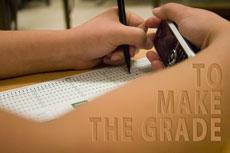Plagiarism pervades university society

Plagiarism pervades university society
Eighteen-year-old Angela Carter (not her real name) had never cheated on her own coursework. But when a busy friend needed to pass just one more class as part of her master’s degree at another university, Carter saw no problem in “helping her out.”
“It was a self-paced online class,” Carter said. “This lady was a 30-year-old mother of four, and she just didn’t have the time to do it. She offered me $300 to do the class for her. I did all the homework, everything – I had it all done in two weeks.”
The coursework wasn’t a problem for Carter. What did scare her was taking three proctored tests, using her friend’s drivers’ license as identification.
“I looked a lot like her,” Carter said, “but she was 30 and I was 18.”
Once, the proctor looked at the ID and remarked, “Wow, you’ve really changed.”
“I laughed and said, ‘That’s what having four babies does to you,” Carter recalls.
She never got caught.
And she is not alone.
“Plagiarism is the one university violation that has increased the most in the last 10 or 15 years,” said Doug Carnahan, dean of students. “It’s really come to the forefront.”
Many Missouri Southern professors prefer to deal with instances of cheating themselves. The typical punishment is a warning and a zero on that particular assignment or test. But academic dishonesty can also result in more severe disciplinary action, including suspension or expulsion from the University.
“We’ve highlighted it as much as we can in the student handbook,” Carnahan said. “It’s actually one of the first things we talk about, academic integrity of the University. We’re trying as hard as we can to let students know right from the beginning that cheating is a serious violation.”
Many students resort to cheating because of stress.
“Grades are so important now, and pressure is high to do well,” Carnahan said. “A lot of students are taking the shortcuts, and they’re getting caught, and they’re paying the price.”
Dr. Michael Garoutte, director of the honors program and associate professor of chemistry, agrees.
“Students are so over-committed that they don’t have time to do the work that they’d like to,” he said. “And since they’ve put themselves or they’ve been caught in this time crunch, they perceive that the only thing they can possibly do with the limited amount of time they have is plagiarize.”
But professors have little sympathy for students who cheat, regardless of the cause.
“Everyone knows that student life is full of pressure,” said Dr. Lanny Ackiss, professor of English, “but that’s one of the things that makes a college degree meaningful, that one copes with the pressure, and survives, and excels.”
Ackiss said he can identify a plagiarized paper after reading just a few sentences.
“Experienced writing teachers can read a student’s style the way most people can read people’s faces,” he said. “In writing classes, it’s surprisingly easy to spot. That’s one of the reasons it’s not a huge problem: we know our students’ styles so well.”
Administrators say students faced with the temptation to plagiarize should stop and think about what they are really doing.
“What happens with plagiarism is you’re passing off someone else’s work as though it were your own, and that’s so dishonest that it wouldn’t work on the playground in third grade,” Ackiss said. “… Maybe the latest forbidden fruit is how tempting it is to do it, even though we know it’s wrong.”
Ackiss said students will face consequences for cheating, whether or not they are caught by the University.
“In the long run, cheating is its own punishment,” he said. “Cheaters are ultimately depriving themselves of both learning and of the satisfaction of being a moral and upright person. And that costs a lot, or it ought to.”
Even though Carter didn’t get caught, she would not engage in “helping” another student in that way again.
“That was four years ago,” Carter said. “From 18 to 22, people mature a lot. I was a really poor college student at the time, and I just thought, ‘Hey, I can get $300 out of this.’ But I wouldn’t do it again. It was stupid and reckless.”
Your donation will support the student journalists of Missouri Southern State University. Your contribution will allow us to purchase equipment and cover our annual website hosting costs.



























